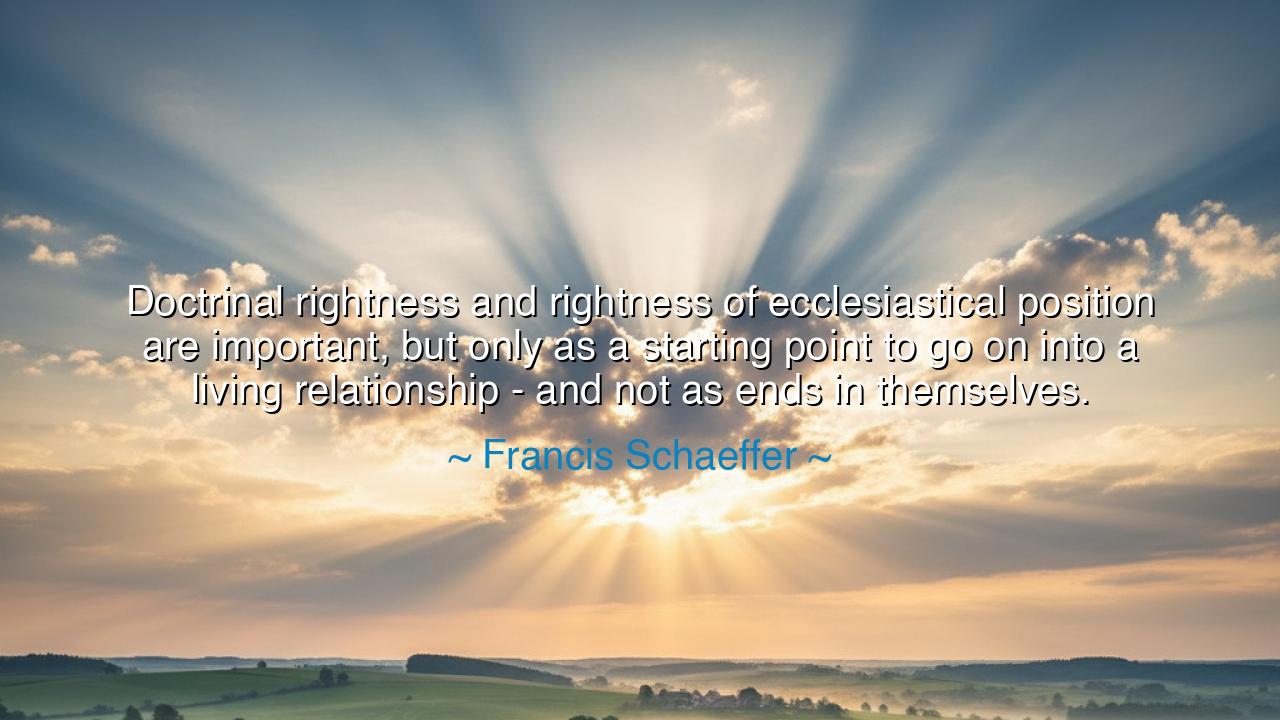
Doctrinal rightness and rightness of ecclesiastical position are
Doctrinal rightness and rightness of ecclesiastical position are important, but only as a starting point to go on into a living relationship - and not as ends in themselves.






The words of Francis Schaeffer—“Doctrinal rightness and rightness of ecclesiastical position are important, but only as a starting point to go on into a living relationship—and not as ends in themselves”—resound with the call to move beyond mere form into spirit. They remind us that faith is not a dry set of rules carved in stone, but a living bond, breathing and alive, between the soul and the divine.
The ancients knew this tension well. Priests and philosophers warned against the danger of clinging only to ritual, of mistaking the shadow for the substance. The law, the creed, the doctrine—all were guides, but never the destination. Schaeffer declares that doctrinal clarity and ecclesiastical position may build the foundation, yet the true dwelling is not found there—it is found in the living relationship with God and with others.
To rest solely in correctness is to stop short of the journey. A man may hold the purest creed and stand in the highest position, yet if his heart is cold, his soul remains unfulfilled. Faith without love becomes brittle; knowledge without relationship becomes pride. Thus, Schaeffer points to a deeper truth: that orthodoxy must always be a beginning, never the end.
This wisdom is both humbling and heroic. It reminds us that the essence of religion is not in walls of doctrine but in the fire of communion. To walk with God, to love one’s neighbor, to embody grace—these are the living signs of truth. The ancients would have called this the harmony of form and spirit, where structure guides but life transforms.
So let this teaching endure: honor doctrine, respect position, but never mistake them for the fullness of faith. They are the road, not the destination; the vessel, not the treasure within. For the highest calling is not merely to be right, but to be alive in relationship, where love, humility, and truth take root and bear fruit for eternity.






VHhoang van hung
I really appreciate Francis Schaeffer’s point that doctrinal rightness should be a starting point, not the ultimate goal. In so many belief systems, there’s a tendency to elevate being ‘right’ over actual personal growth and connection. But how do we avoid using doctrine as an end in itself and instead focus on living in a way that reflects those beliefs in meaningful, relational ways?
LCHo Linh Chi
Schaeffer’s perspective is a thought-provoking one. It’s crucial to have correct doctrine and ecclesiastical positioning, but those are just the beginning. How often do we see people stuck in rigid positions, thinking they’ve 'arrived' because they have the right answers? How do we move from just intellectual understanding to true relational living, especially when it comes to faith or belief systems?
NHDo Ngoc Huy
This quote by Francis Schaeffer makes me think about how often people focus solely on being 'right' in religious or spiritual matters without considering the bigger picture of a living relationship. What good is a perfect set of beliefs if it doesn’t lead to empathy, understanding, and real connection with others? How can we shift our focus from ‘being right’ to genuinely fostering relationships based on those beliefs?
CDNguyen Chau Duc
Francis Schaeffer’s quote really highlights the difference between doctrinal correctness and the importance of a deeper, living relationship. It’s easy to get caught up in having all the right beliefs or positions, but what if those things don't lead to genuine connection? How do we ensure that our beliefs serve as a foundation for growth and not just a checklist? Can doctrine ever truly replace meaningful personal connection?